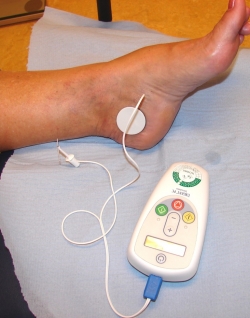What follows is yet another attempt to demystify chronic
illness and disability. As always, I write to inform others and to process what I have personally experienced. All of this has been entirely new for me, too. Most people,
fortunately, do not have to plan their life around a robust pill regimen and a
series of never-ceasing medical appointments. What I am about to
describe is a complicated process in which I must take part because, quite simply, I have to.
On Monday morning, I arrived on time for the latest study and was
told to undress from the waist down. As I donned the thick hospital gown, I knew my lower extremities were to be exhaustively tested. The urology nurse and
I have worked together weekly for the past four months and developed a strong rapport.
Our personalities are similar. Though we have a sensitive, emotional core, we’re
both very no-nonsense and direct. I trust her with my care and I know she respects
me as a patient.
As is usually the case, less invasive procedures have been
tried first, before calling in the heavy artillery. Every Friday morning since
the Autumn, I’ve had a small acupuncture needle inserted into my ankle, which is
then electrified. The insertion is not especially painful, but the electric current
applied to the site can be uncomfortable for a minute or two until the body adjusts. The
process lasts about half an hour from start to finish. I’ve undergone sixteen
of these at last count.
Overactive bladder, in my case, is caused when the spine
over-signals the bladder to urinate. The inserted needle stimulates the nerve that runs
from the ankle to the base of the spine. This procedure has been successful to a degree, but
not enough to completely take care of the problem. I can now sit in a movie
theater or at a friend’s house for an hour or so without feeling a constant
compulsion to get up and go to the bathroom. But sooner or later, the urge becomes
overwhelming and I have no choice but to return once again.
I’ve come to a greater recognition of how Puritanical a
society we still are, especially as concerns bodily functions. The urology
nurse with whom I’ve grown close sees particular organs and orifices every day
as part of her job. But it nonetheless felt awkward to bare my private parts to
her. It cuts both ways, I suppose. If she were a complete stranger, I suppose I would feel
a bit less exposed. Still, at the same time, I find I trust her to look out for
me. If I didn’t know her at all, our patient/provider relationship would be
very different, perhaps even for the worst.
Catheters are a special kind of torture. No amount of
lubricating gel or sharp intakes of breath allows one the ability to forget that a large foreign object
has been forcibly inserted into one’s urethra. Not one, but two of them were
used to monitor several different levels simultaneously. Video screens set up before
me produced data that seemed meaningful enough, except that I couldn’t
understand any of the output beamed outward. All I could focus on is how immobilized I was, sitting upright in a very awkward position, not able to find any comfort whatsoever.
The urologist doctor arrived later to observe. She is extremely
attractive, which usually manages to distract me from my concerns and worries for a while. With tubes
inserted into different, highly intimate parts of my body, I couldn’t much
enjoy the visual spectacle. In a different context altogether, there might well have been
something sexual about the whole thing. Most people don't take such an intensive look at my genitals unless they're sleeping with me.
With interminable testing and medical procedures, I’ve
learned to find diversions whenever possible. I am reminded of how my female
friends describe a visit to the gynecologist: awkward and slightly mortifying.
Fortunately, the worst is over. I have one remaining test that requires catheter
insertion, but I’ll be numbed up severely beforehand. A small video camera
attached to the catheter will show the urologist a complete picture of the
inside of the bladder. The procedure usually lasts less than five minutes.
Surgery has already been scheduled for the middle of March.
As I believe I’ve written about before, a small pacemaker-like device will be
implanted next to the bladder. It will provide the proper amount of signaling,
taking over for the spine, which has been dysfunctional for years. I’ve had
this issue for five or six years, but the problem didn’t become this severe until
about eighteen months ago.
I’m enthusiastic about the procedure. It embarrasses me to
be the party guest who visits the bathroom four times every hour, when everyone
else goes once. Recording how much I urinate and how often (part of treatment) can
be tedious, and servers as an alarming reminds me of just how much the problem has deteriorated
over time. Still, there are treatments to fix the bladder, and I have no doubt
that this condition will get better.

No comments:
Post a Comment